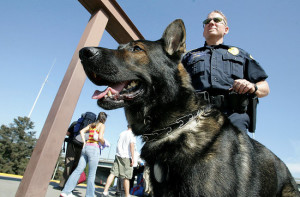
Before oral argument started for Hollingsworth v. Perry yesterday, the Supreme Court handed down it’s decision in Florida v. Jardines. The crux of the decision is this: a warrant is required when law enforcement use drug-sniffing dogs on a citizen’s property.
The true question before the court was whether or not a “dog sniff” obtained by a dog on the premises constituted a “search.” Under 4th Amendment Law, if police conduct violates a citizen’s reasonable expectation of privacy, it is a “search.” Generally, if a search is to be conducted law enforcement must have a warrant supported by probable cause. Probable cause is determined by a neutral and detached magistrate judge. The judge reviews the facts presented to determine if a reasonable person would conclude that it is more likely than not that the named items or persons would be found on the premises.
The State of Florida had a solid position to argue that dog sniffs on private property are not searches. According to the Supreme Court’s previous rulings, neither a dog sniff of luggage at an airport nor a dog sniff of a stopped automobile violate a person’s reasonable expectation of privacy. Consequently, these procedures can be conducted without a warrant and do not require probable cause.
Antonin Scalia, one of the Court’s most conservative Justices and a staunch textualist, focused on the nature of the 4th Amendment and the invasion of privacy rights as the basis of his conclusion. “At the Amendment’s “very core” stands “the right of a man to retreat into his own home and there be free from unreasonable governmental intrusion,” Scalia opines. “This right would be of little practical value if the State’s agents could stand in a home’s porch or side garden and trawl for evidence with impunity; the right to retreat would be significantly diminished if the police could enter a man’s property to observe his repose from just outside the front window.”nable expectation of privacy, are not searches, and do not require warrants, as such. The general premises is that a person or his/her property’s smells are open to the public, and do not give rise to an invasion of privacy.
This may be a first for me, but I couldn’t agree with Justice Scalia more. The principles of the 4th Amendment seem to have whittled away over the years. Everything from full body scanners, to “exigent circumstances” warranting no knock invasions of homes have compromised the principles of privacy embodied in the 4th Amendment.
While it’s just one small step, at least there won’t be a dog on your stoop without a warrant, now.